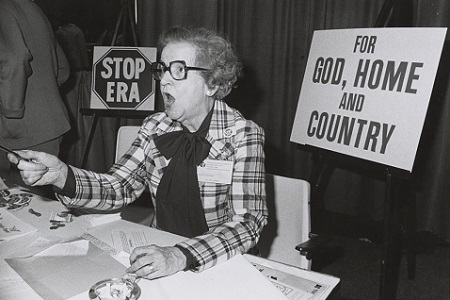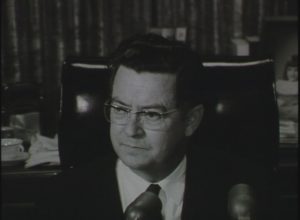
Cheer for cheer, epithet for epithet, the ‘pro-family’ gathering easily matched the ardor of its counterpart in the Sam Houston Coliseum, and its rhetoric was substantially greater."The Nation: What's Next for US Women," Time (December 1977)
The National Women’s Conference succeeded in building a bipartisan coalition of women in support of a sweeping feminist agenda. Opposition forces formed their own united front in response, pitting “women’s rights” against “family values.” Members of the conservative IWY Citizen’s Review Committee turned out en masse to state and territorial meetings, hoping to influence recommendations and win inclusion among delegations. After securing only 20 percent of the delegate seats, the opposition decided to host an adjacent counter-rally in Houston.
On November 19, some 12,000 people gathered at the Astro Arena to take part in the Pro-Life, Pro-Family Rally. Similar to the conference’s National Plan of Action, the rally prepared a Request to the President and Congress with resolutions against reproductive freedom, the Equal Rights Amendment, and LGBTQ rights. Rally organizers purportedly delivered 300,000 signed copies of the petition to Washington, DC, via chartered plane. While conservative activist Phyllis Schlafly received the most attention as a leader of the opposition, Lottie Beth Hobbs—a Texas native and founder of the conservative organization Women Who Want to Be Women—came up with the idea for the counter-rally. She spoke at the event, as did former Houston Mayor Louie Welch and Texas State Representative Clay Smothers. In stark contrast with the conference delegation, the rally assembly was almost entirely white and encompassed large numbers of men and children.
The city of Houston was itself at odds over its involvement with the National Women’s Conference. (The headline for one New York Times article reads, “Houston Hosts, if Not Toasts, Feminists.”) While local women’s organizations and cultural institutions planned adjacent programs, most major businesses decided not to participate. The Houston City Council also abolished the local office of Women’s Advocate—the very position that had encouraged the selection of Houston as the conference site in the first place—months before the conference opening.






